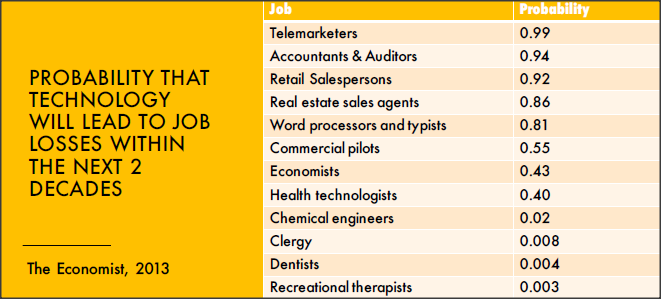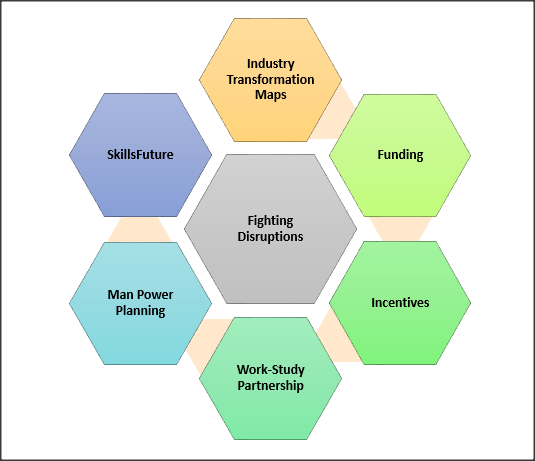This is the third and final topic from the SHARE conference. (Part 1 is concerned with harmonisation. Part 2 is about learning outcomes and internationalisation.)
The topic that I found most fascinating at the SHARE Regional Conference was “Case Study Singapore: Disruption in Higher Education.” The presentation was given by Dr. Lim Lai Cheng, the Executive Director of SMU (Singapore Management University) Academy.
Some Statistics
Dr. Cheng began her talk by showing Singapore’s unemployment statistics in 2016, which stated that the number of unemployment had risen to 3.5% This might seem low to us but for Singaporeans, this was a big deal. This statistics implied that there were only 93 jobs for every 100 job seekers.
Why did it happen?
Disruption
Disruption was the answer. Disruptions included the change in consumption patterns, the rise in market volatility and, of course, technological innovations. This was supported by the Economist which published a 2013 article on the probability that technology would lead to job losses within the next two decades. Since then there have been many articles forecasting similar things.

What technological disruption does, has done and will do is that it generates massive skill gaps. McKinsey and Co., reported in 2015 that there would be 40 million people in deficit of high-skilled workers in advanced countries and 90 million in surplus of low-skilled workers in advanced countries.
Gig Economy
During her talk, Dr. Cheng introduced me to a new word “Gig Economy.” I couldn’t believe that I hadn’t heard of Gig Economy before today. The reason that the the speaker had brought up this word was because Gig Economy was related to the new generation of young people, who would be happy to have in temporary positions under short-term contract or engagement with any particular organisation. This is exactly what Gig Economy is. Workers are connected on an online platform, work whenever they want and are paid for a specific task.
Some Questions
Let us come back to higher education. We have to ask ourselves:
- What are we doing in terms of preparing students?
- What are we doing so we are not disrupted?
- What role are we doing in helping shape the country’s future?
Man Power Planning
In order to answer these questions, what Singapore has done is Man Power Planning. That is, Singapore has looked to the future and told themselves “in 5 years, we need x people for y.” Now they know what they want. They can turn to higher education for help in training and preparing human capital.
Singapore realises the importance of education, especially the development of skills, by saying that education is necessary to retain economic competitiveness. What has Singapore done then?
Singapore knows that human capital development needs money. They know that without any financial resources, it would be infeasible to ask people just to go and develop their skills or increase knowledge necessary for the future.
SkillsFuture
Consequently, Singapore has come up with a scheme called SkillsFuture. SkillsFuture is a national movement to provide Singaporeans with opportunities to develop their skills to fulfill their true potential. What does this actually mean? It means that all Singaporeans with the age of 25 and above are entitled to receive $500 (SG Dollars) to use to enroll in the courses offered by the SkillsFuture scheme. The government will provide credit top up from now and again. This is known as SkillsFuture Credit. To put it simply, Singapore pays its people to re-tool, re-skill and upskill themselves!
Recommendations
Singapore has set up a committee called the Committee for Future Economy who has provided the following recommendations for fighting disruptions.
- Twenty-three industry transformation maps have been drawn up. Unfortunately, there was not enough time for the speaker to provide the detail of what they are.
- Work-study and public-private partnerships are encouraged to bring about innovations and development of industry skills.
- Firms are incentivised to develop human capital.
- Higher education institutes are provided block funding to conduct skill training, especially in such areas as data analytics, blockchain, cybersecurity and other related areas.

Funding
Number four in the above list is particularly interesting because the government provides funding for higher education institutes, especially research universities, to conduct training. Why? The reason is because there has been a massive mismatch between what universities teach and what the government wants. By providing the funds, the government can now say to the universities what they want. The universities have to obey if they want money!
Singapore has not forgotten about polytechnics. They have introduced what they call the Earn-and-Learn scheme. This is basically on-the-job training, albeit very focused.
Uncollege
Moreover, recently, there has been a movement against the four-year degree called “Uncollege” where younger people believe that it is more useful to accumulate professional certificates instead of a normal university degree.
Change in Paradigms
Dr. Cheng, therefore, mentioned that there would need to be a change in paradigms in higher education. Universities would have to consider:
- Traditional System vs Open System
- Pre-Employment vs Continuing Education (Pedagogy vs Andragogy)
- Single Track vs Multi-Modal Tracks
- Degree vs Micro Credentials
One should be able to study a few credits across many institutions. Students should be able to combine the obtained credits to gain a degree. In the case of skills, we must be able to validate them so that employment is possible across the region.
Success Factors
Before the end of her talk, Dr. Cheng summarised three success factors that would allow us to fight disruptions.
- Political wills
- Clear messaging
- Funding and Incentives
She also left us with a message of being open minded. That is, universities have to rethink how to reward people. Universities have to rethink how to give seats to people, i.e., younger and older but with strong experience. This will actually enrich their cohort.
I would like to thank Dr. Lim Lai Cheng, the Executive Director of SMU Academy for a very insightful presentation. The information provided by her is very useful and valuable. Thank you.
